When people think about Montessori schools, some of the most prominent materials that come to mind are the beautiful practical life opportunities in our Pre Primary (3-6 Years) environments. There are small wooden trays with pouring and transferring works. There are whole lessons dedicated to the arrangement of flowers. The children prepare their own snacks and wash their own dishes. They use special frames that teach them to tie, buckle, and snap.
Those practical life materials at the Pre Primary (3-6 Years) level are so important. They are also very visible, because they take on the form of a standard material on a shelf, so it can sometimes appear that practical life is a part of our education for children up to age six, but not after.
What happens when children reach the Lower Primary (6-9 Years) and Upper Primary (9-12 Years) and beyond?
The work of practical life does not stop, nor does it become any less important. It does, however, take on different forms and blend into the rest of the program somewhat. The following skills are critical steps toward becoming an independent adult; we ensure to present them when the child is ready. Is learning to tie one’s shoes any more or less important than learning to balance a budget? Of course not. Both are necessary but are best presented at different times in our lives.
The following are just a sample of some of the practical life skills taught to our older students. Often embedded into the curriculum, they still help kids reach independence milestones.
Time Management
No one is born knowing how to manage their time. First, it takes a good sense of time as well as the ability to set goals and follow directions. Once a person has those basic skills mastered, they can gather tools to help them meet their goals within a set time.
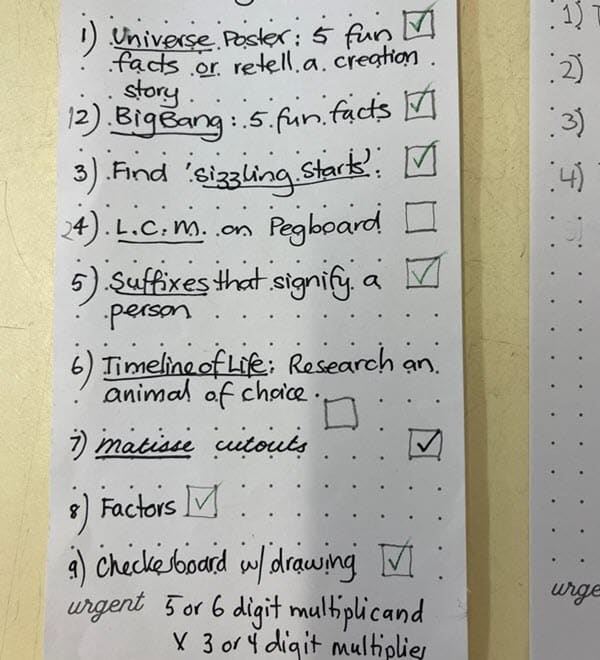
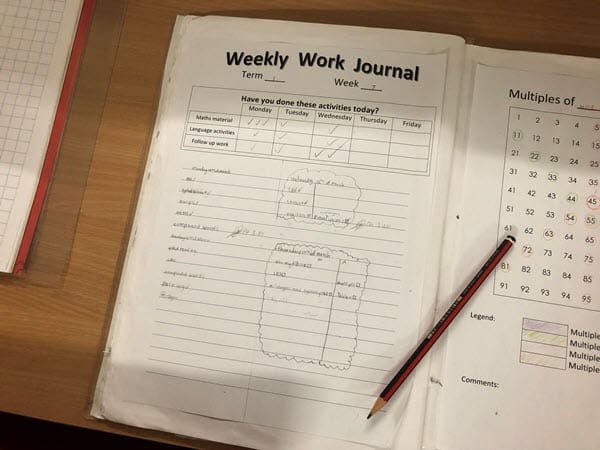
In our primary classrooms, this often begins with a work plan. Work plans can take on many forms, but at its most basic, the plan sets forth a list of tasks that are to be completed over the course of the day or week. Students have some choice regarding the order they will complete the tasks and how they will go about doing so, but the expectation is set.
Do children take their work plans and successfully complete them all the time? Absolutely not, but that’s where the time management learning comes in. Let’s assume a child is getting their language work done each day all week, but on Friday it becomes obvious that they have not done much in the way of mathematics. This happens – frequently – and our educators make sure to work with students (rather than dictate to them) to find ways to resolve the issue.
When an educator notices a pattern of unfinished work, they will sit down and meet with the student. These meetings are not punitive. The child understands this as the culture in the classroom has been set. The educator might ask the child why they think the mathematics work isn’t getting done. Is it too challenging? Is it too easy? Is it just something they don’t particularly enjoy? What does the child need to make sure it gets done?
Sometimes a child will be able to reflect and suggest a solution. Other times, they might need some ideas from the adult. They may need a refresher lesson, or to be challenged a bit more. They may need to commit to doing their mathematics first every day just to make sure they don’t avoid it. Regardless of the course of action, time management is a constant and fluid area of work for all students as they age and will serve them well in adulthood.
Development of Social Skills
Learning how to engage with others isn’t always easy. During the Lower Primary (6-9 Years), children are transitioning from enjoying mostly parallel play in their Pre Primary (3-6 Years) classrooms, to developing deeper friendships for the first time. It’s only natural that conflict will arise. As children age and go through the Upper Primary (9-12 Years) and adolescent years, puberty and a developing sense of self and individuality creates more opportunities to relate to peers in new ways.
One of the most wonderful gifts of the Montessori classroom is the blocks of flexible time. Many schools have blocks dedicated to specific subjects, and these time periods are rigid and centered on whole-group lessons. In a Montessori environment, where there is more flexibility, it’s simple to call a class meeting whenever it’s needed. If the children come inside from lunch, for example, and there has been a conflict – there’s no need to jump right into that planned science presentation. It can wait.
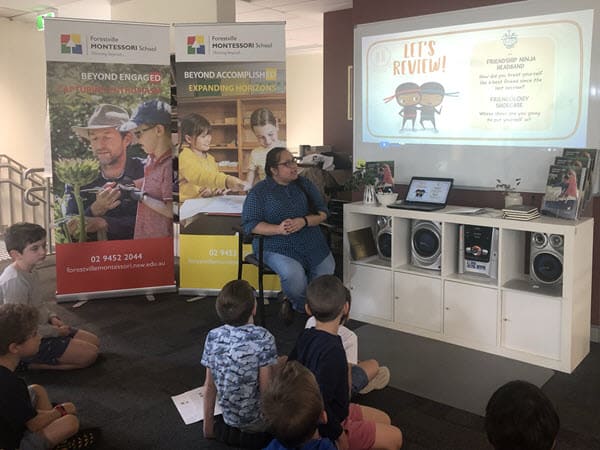
Class meetings are a great way to help children resolve conflicts. Our educators manage to create problem solving structures without pointing fingers at individuals. Rather, they ask students to generate solutions. This approach empowers children, normalises conflict, and lets them practice a wide variety of strategies even when they’re not the ones experiencing the conflict.
Of course, a class meeting isn’t always the solution when emotions are running high. Most classroom environments have a dedicated space a child can choose to go to cool down; all classes ensure the individual’s needs are met. Sometimes this entails a micro mediation session, allowing everyone’s thoughts and feelings to be heard and acknowledged. At FMS, we also tap into URSTRONG program. Click here for more details
Self-Care
Self-care is a never-ending process, and really consists of a series of daily and other regular and periodical practices. Once children reach the primary years, they have mastered many of the basics, but they are ready to start learning more nuanced and progressively more difficult skills.
Nutrition is something we never stop teaching our students, regardless of their age. Food preparation is part of this, but it does take on new forms as children age. Every classroom has different ways of incorporating food prep and nutrition education. Some create special snacks together for birthdays, others explore cultural cuisines from around the world. Children continue to hold autonomy in making choices about their own food needs; they decide when to eat snacks but are responsible for doing so within certain parameters (such as how many children may use the snack table at a time, cleaning up procedures, etc.).
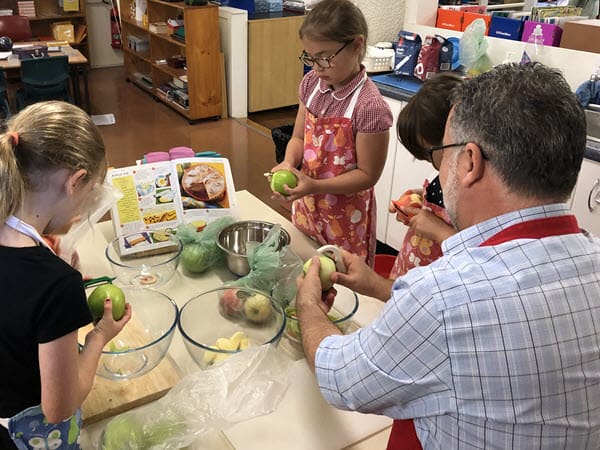
Physical activity and exercise continue to be important throughout our lives as well, and healthy habits built early make a difference. Some classes take walks together, others explore yoga. The possibilities are endless, but the goal is the same.

Lastly, stress management is introduced. Stress and frustration are a normal part of life, but there are things we can do to manage their intensity, frequency, and our reactions to them. Children may learn a wide range of techniques in the classroom, including breathing strategies, meditation, mindfulness, and more.
Care of the Environment
At the beginning and end of each day, the children at FMS can be seen caring for their environment. At home you might call this jobs or chores. We like to use the term, Care of the Environment to send the message that everyone is involved and it is about care, not about being busy but being purposeful and everyone helping to build our community. Students can be seen taking down the chairs and wiping the tables in the morning. By the afternoon, it’s a full operation with everyone tasked with important caring roles. This can include, sorting the pencils, lining all the materials properly on the shelves, arranging the library books, wiping the snack tables, sweeping the floors, tidying up the kitchen, taking the recycling materials to the depository areas, feeding the fish or the mice, on and on the list goes. All will depend on what activities have taken place that day, but you can be sure that before the children leave, their environment is well cared for and ready for the next day.
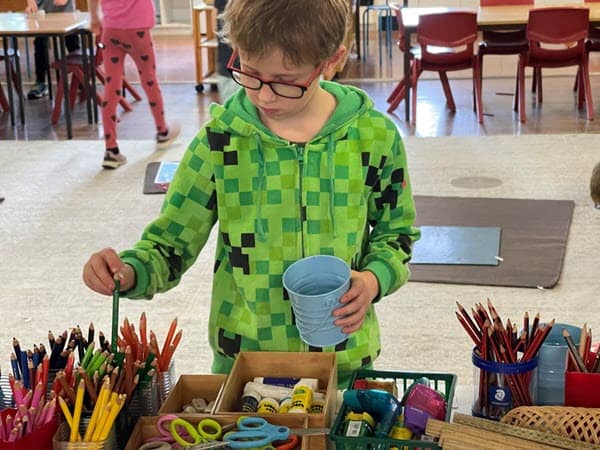

Gardening
At FMS we are very lucky to be surrounded by beautiful gardens. Our students work with our resident horticulturists to learn about planting, growing, propagating, and harvesting. Seasonal produce is planted as part of our ‘Seed to Plate’ program and cooking (and eating organic food!) is a big part of life at FMS. There are times of abundance when we can all enjoy figs, oranges, limes, bananas, zucchinis, capsicum, strawberries, cherry tomatoes, cucumbers, lettuce, fresh herbs and so much more. We even have a coffee bean tree! It’s truly a very special part of our community.
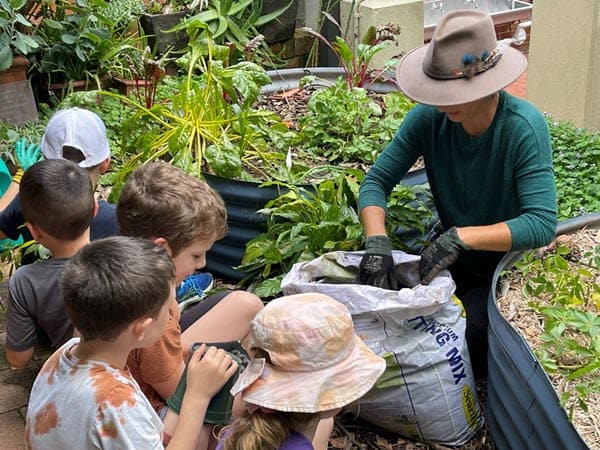
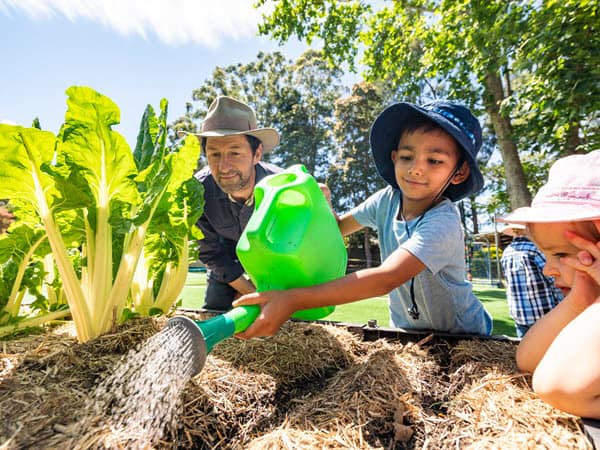
Entrepreneurship
When children reach adolescence, the Montessori curriculum centers on creating a microeconomy. Traditionally students work on a farm and do everything needed to sell what they produce. Some Montessori schools still operate this way, while others have found creative, modern ways to achieve the same goals. One popular alternative, for example, is to run a weekly or monthly coffee shop.
Students at this level are responsible for all aspects of the business, with their guide there for modeling and support. They make phone calls, order supplies, make connections with other community organizations, create and balance budgets, manage marketing, and learn about customer services.
At FMS, we have our own version of this that starts with our gardens. The students nurture the gardens with the amazing help of our resident horticulturists. Our upper Primary (9-12 Years) students are masters at designing the MonteMarket where they make and sell produce to their families. Let’s not forget the chickens, students must care for them and sell the eggs they produce.
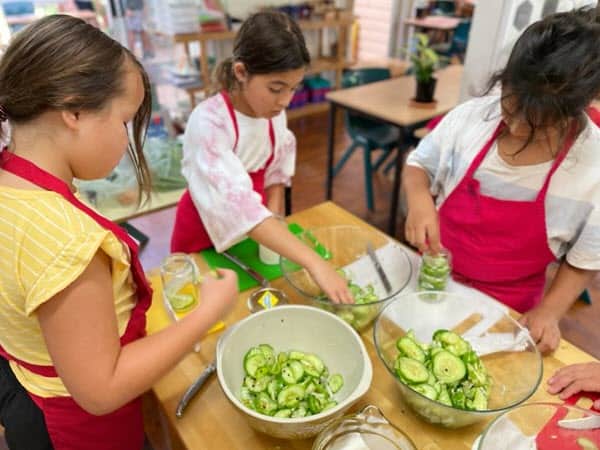
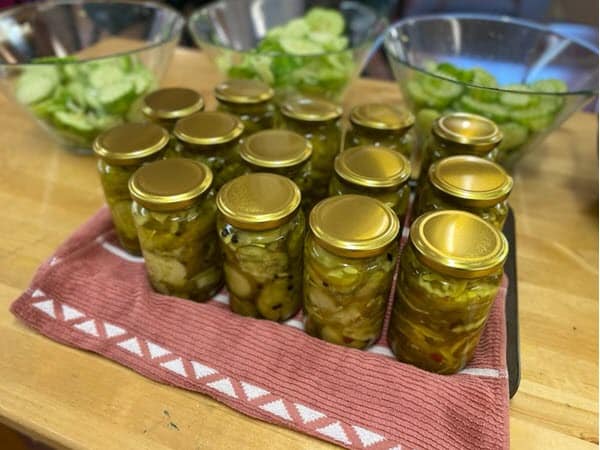
Remember that while practical life work is critical for the Pre Primary (3-6 Years) Program, it is certainly not the end. This work continues for our students into adolescence. Want to learn more? Contact us to have a conversation about Montessori education or to schedule a visit.



